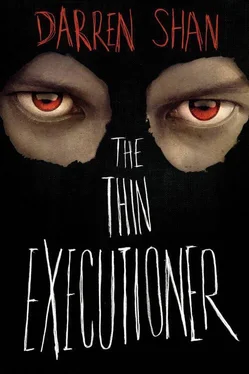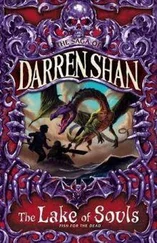When his eyes had adjusted, he focused on the sun. It was almost sunset, and the fiery globe was sinking fast. He watched it go down, awestruck, shivering as the earth seemed to eat the sun until there was only a tiny arc left, then nothing.
His face was wet. It felt like rain, but it couldn’t be — the sky was clear. Exploring with his fingers, he was astonished to find that he’d been crying. The simple beauty of the setting sun had reduced him to tears. For most of his life he hadn’t cried, even when truly miserable or in pain. Now here he was, weeping at a sunset!
Jebel should have felt foolish, but he didn’t. Wiping his cheeks clean, chuckling wryly, he stood and surveyed the land. By the fields of lush grass stretching away in all directions, he knew that he had come up somewhere between the as-Sudat and as-Surout, the fertile green belt of Abu Aineh. If he cut southeast, he couldn’t miss Wadi.
Judging his direction by where the sun had set, Jebel ambled from the cave, rested a moment at the bottom of the small hill to enjoy the scent of grass, then set off on the final leg home.
Jebel returned to Wadi one hot summer evening, much like the day when he had left. If he closed his eyes, he could have pretended the year was a dream. But Jebel didn’t want to pretend. He was fully focused on the reality of the moment and all that was to come.
Making a slight detour, he passed through the place where the mukhayret was traditionally held. Many tents and stalls were being set up. That meant the festival hadn’t taken place yet. Jebel was in time. He said a quick thank-you to the gods, then turned for home, not sure what sort of a reception to expect.
The house hadn’t changed, except it was dustier than Jebel remembered. He could have walked straight in — it was his home — but he felt awkward. After pausing nervously on the front step, he gulped and rapped on the door.
“Enter,” came his father’s voice. Jebel took a deep breath and went in.
Rashed Rum was sitting at the table, washing his dinner down with a mug of water. J’Al was with him but had finished eating and was rubbing the back of his neck, twisting his head from left to right. J’An was in a corner, exercising.
Rashed Rum looked up with a smile, not recognizing the thin, scruffy boy. “Yes?” he said amiably.
“I’m back, Father,” Jebel said, and all movement in the room ceased.
Rashed Rum stared at the skinny boy in the doorway. J’An and J’Al gaped. They couldn’t believe that this was Jebel. They had given him up for dead many months ago. For a moment the executioner thought the boy had wandered into the wrong house. But then he saw traces of his dead wife in the youth’s eyes.
“ Jebel! ” he roared, with more excitement than Jebel had anticipated. Leaping to his feet, Rashed Rum raced across the room, caught his youngest son in a bear hug, and whirled him around. Jebel laughed, then hugged his father and wept. J’Al and J’An raced forward, delighted to see their long-lost brother.
“Where have you been?” J’Al roared, clapping Jebel on the back.
“Why did you leave without telling us?” J’An shouted. “We were worried sick! You…” He stopped and squinted. “Are you crying? ”
Jebel broke free of his father’s embrace and laughed through his tears. “Sorry,” he half-sobbed, half-chuckled. “I didn’t expect such a welcome. I thought… I don’t know. But not this.”
“You are my son,” Rashed grunted. “You’re always welcome, even…” He had been about to say “even if you disgraced yourself and tarnished the family name,” but he hesitated and instead said “no matter what.”
There was a long silence, all four unsure of what to say next. Jebel broke it by asking if there was any news.
“Any news?” J’Al exclaimed. “You’ve been away for a year — of course there’s news! But where to begin? Have you heard about—”
“Peace,” Rashed said. His gaze was on Jebel, and though he still looked at his son warmly, there was concern in his expression. “We should hear from Jebel first.” He led the boy to the table, and they all sat down together, as they had so many times in the past. “I’m sure you have much to tell us. But first, your quest — was it a success?”
J’Al and J’An hid smiles. They appreciated the fact that their father was being diplomatic, but really! It wasn’t a question of whether or not Jebel had made it to Tubaygat but if he had got any farther than the borders of Abu Aineh.
Before Jebel could answer, Rashed said, “We won’t be ashamed if you failed. I should have mentioned you when I praised J’Al and J’An in public. This was my fault, and if your quest was unsuccessful, I will accept the blame. You need not worry about people criticizing you or—”
“Father,” Jebel interrupted. “It’s all right. I don’t care what people think.”
“Then you did fail,” J’An said.
“No, I didn’t,” Jebel replied quietly, causing his father and brothers to blink.
“What do you mean?” J’Al snapped. “Are you saying you’ve been to Tubaygat?”
“Yes.”
“Nonsense!” J’An snorted.
“Jebel,” said Rashed uneasily. “To undertake such a harsh quest was an act of bravery. If you failed, you need not feel ashamed. But if you lie about it now…”
Jebel wasn’t surprised or offended by their doubts. In their place, he would have been skeptical too. “We can discuss this later,” he said. “First I have a promise to keep. Where are Murasa and her children? I vowed to free them when I returned.”
“They’re in Fruth,” Rashed said. “I didn’t want to keep them here — you know I don’t trust slaves — so I made them stay in their old home.”
“I’ll fetch them,” Jebel said, then paused. “I’m not sure how to confirm their freedom. Are there papers I must sign?”
Rashed gazed at his son, gravely troubled, then saw something in the boy’s eyes that made him bite his tongue. “I’ll take care of the technicalities,” he said gruffly. “Bring the slaves to the palace. I will meet you in the chamber of registration — ask when you arrive, and you’ll be directed to it.”
Jebel bowed and set off for Fruth.
Behind him, J’Al and J’An squinted at their father. “Do you really believe—” J’An began.
“Enough,” Rashed cut him short. “He is my son, and flawed as he might be, I will not have him openly disrespected.” He pointed at J’Al. “J’An Nasrim has returned to Wadi. Find him and tell him that Jebel is back. Ask him to meet us at the palace.” J’Al opened his mouth to argue. “Go now!” Rashed barked, and J’Al was out of the house and running before the echo of his father’s command stopped ringing.
Jebel thought that he’d have to ask for directions to Murasa’s house, but his feet remembered the way, and before long he was standing in front of the doorway with the long strips of colored rope hanging from the crossbeam. “Entrance requested,” Jebel called softly, and a woman’s voice invited him in.
Murasa was playing with her children. When they saw Jebel, the games stopped. Her face whitened with shock, then grew hard. “Greetings, master Rum,” she murmured, standing in order to bow.
“Greetings,” Jebel said politely. He felt even more nervous than he had on his father’s doorstep.
“I am pleased to see you again,” Murasa said unconvincingly.
“And I’m pleased to see you,” Jebel said with more honesty.
There was a strained silence, then Murasa said, “All went well, my lord?”
Jebel winced. “It didn’t go as expected but, yes, I suppose it went well.” He cleared his throat. “I didn’t kill your husband.” Her eyes widened and filled with hope. Jebel hated having to dash that hope, but it couldn’t be avoided. “He’s dead,” Jebel said, and the warmth faded from Murasa’s face. “He was killed by an insane missionary at Tubaygat,” Jebel went on, beginning at the end. Then he told Murasa and the children about his quest, the adventures he and Tel Hesani had faced together and separately, the trials they’d endured, and the awful price they had paid at the finish.
Читать дальше







